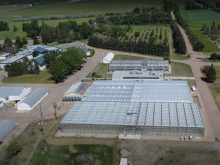A few ranchers will no longer be able to collect “windfall profits” when oil and gas companies drill on their government-leased land.
An interim report on leased agricultural land recommends money from oil and gas companies be paid to the provincial government, not the farmers and ranchers leasing the land from the province.
The money would go into a conservation-type fund and be used for improvements on leased land across Alberta.
“It’s as fair as we could make it,” said MLA Tom Thurber, chair of the Agricultural Lease Review Committee.
Read Also

Alberta crop diversification centres receive funding
$5.2 million of provincial funding pumped into crop diversity research centres
There are about 3,400 grazing lease holders who do not have oil and gas activity on their leased land and about 2,300 who do. In some areas petroleum companies pay more than $4 million annually in compensation to 26 grazing lease holders, while the lease holders pay only $438,000 in lease fees and taxes.
Many areas affected
They are scattered throughout the province where there is intense oil activity such as near Grande Prairie or in the southwestern corner of the province.
David Manning, president of Canadian Association of Petroleum Producers, said the recommendations balance the inequity of producers who have oil and gas under their leased land.
For years, leased land was considered marginal and governments didn’t worry about compensation paid to lease holders. But during the last 20 years of increased oil and gas activity, compensation from petroleum companies has turned into a lucrative business.
Manning said in the recommendations there are no assurances oil and gas companies will pay less money than before, but said it will be easier to negotiate with the government than with individual lease holders.
Lease holders will still have a say in developments on their leased land.
Under the recommendations, lease holders will be paid $500 per well and $300 a year annually until the amount reaches the cost of the lease.
The recommendations are more in line with other provinces.
In Saskatchewan, there has always been a variety of shared amounts between lease holders and government. About five years ago changes were made to pay producers $100 per well up to a maximum of 30 percent of their lease rental. For new wells it’s now $200 a well.
The report also recommended lease holders be designated as gate keepers so people using the land for recreation purposes must seek permission from the lease holder.
The government is waiting for feedback on the interim recommendations. A final report is expected later this year. If accepted the recommendations would go into effect Jan. 1, 2002.
Dean Lien, Alberta’s Farmers’ Advocate, doesn’t expect to hear many complaints from lease holders on the proposed regulations. He doubts if lease holders getting money will complain, and “the rest of the people probably think it’s all right.”
Gary Sargent, general manager of the Alberta Cattle Commission, said the reduction in money to lease holders still must reflect the hassle of having oil and gas companies on the lease.
“There is a lot of challenges having them on site. This needs to be adequately recognized.”
The compensation level must reflect adverse effects, nuisance and inconvenience, he said.
The cattle commission is pleased with recommendations that lease holders can control access of recreational users on the lease.
“It reaffirms the lease holders rights to control access. We thought this very important,” he said.














